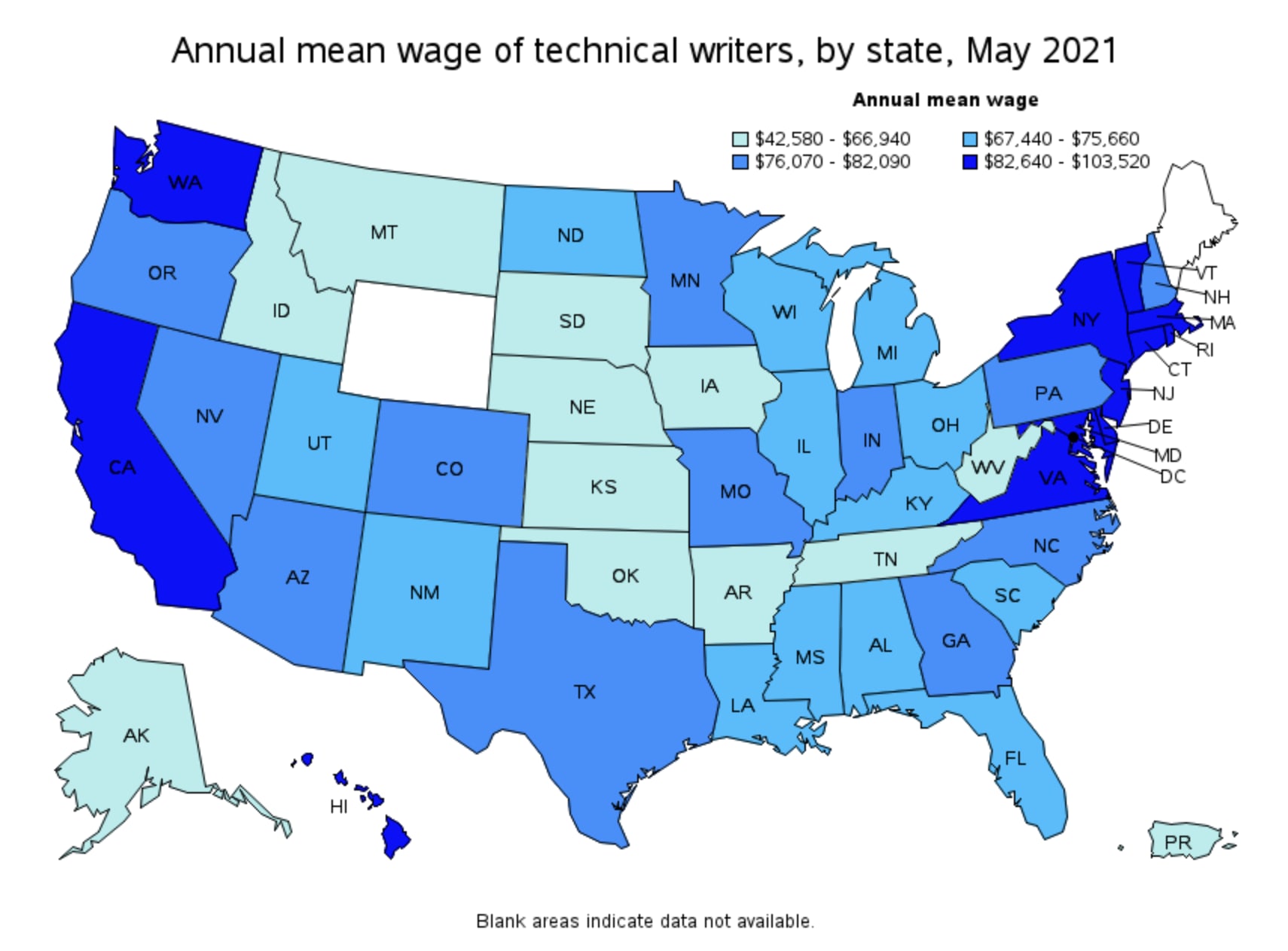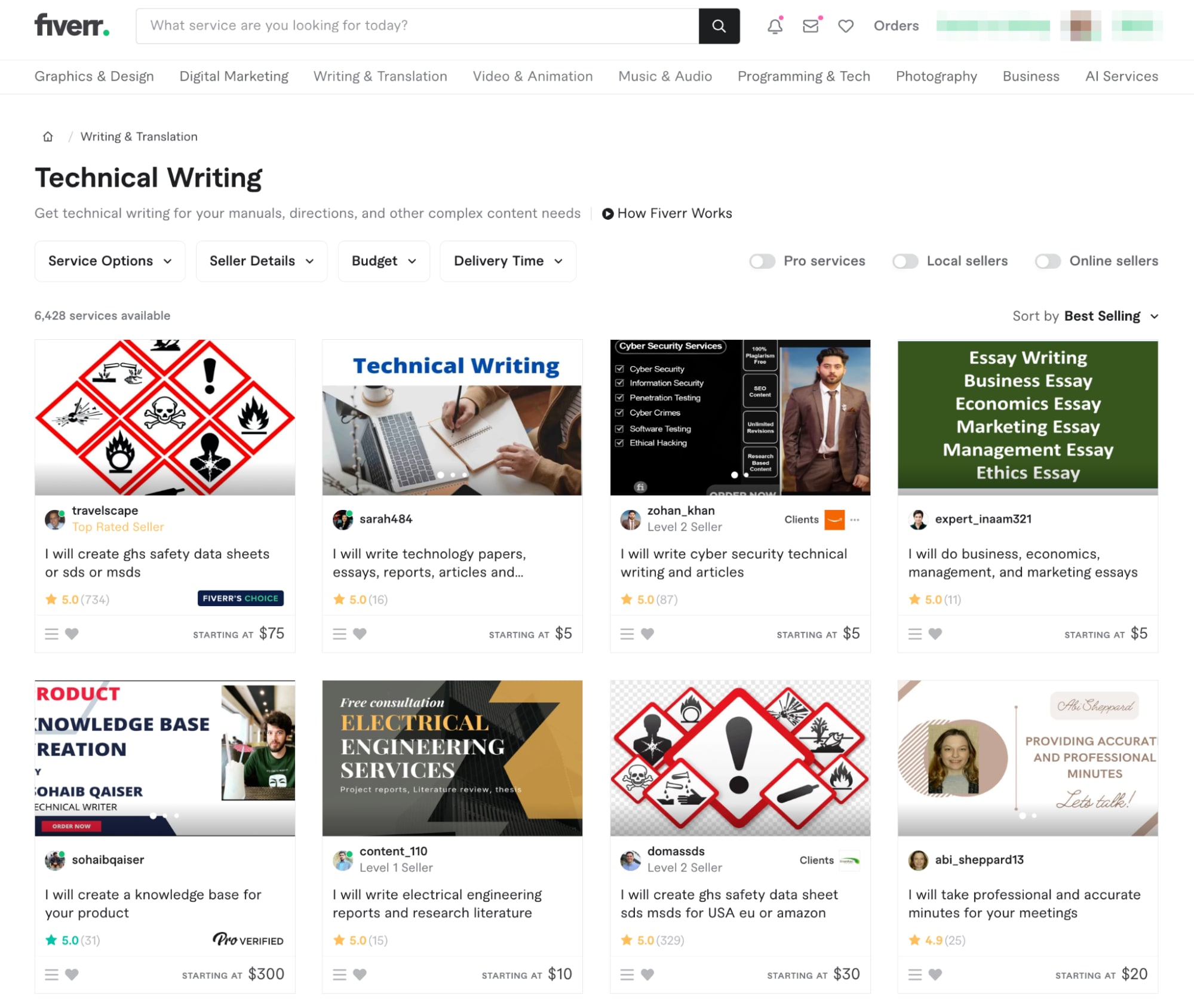Technical Writing 101: Definition, Examples, and How to Become One
A complete guide to everything you need to know about technical writing and technical writers
 March 18, 2023
March 18, 2023 12 minute reading
12 minute reading
Technical writing is a form of writing on a specific topic that requires guidance, instruction, or explanation. This writing style serves a unique purpose and therefore has very different qualities than other types of writing, such as creative writing, academic writing, or business writing.
Because of this, technical writing is vital to a wide range of businesses and industries. Without it, complex topics and certain procedures would be difficult—or impossible—to understand or accomplish.
To recognize the important role technical writing plays in your own business or sector, it’s important to first understand what technical writing is, along with its unique characteristics.
In this guide, we cover all there is to know about technical writing, so you’ll be an expert in no time
What is technical writing?
Technical writing is a writing discipline that involves communicating complex information to those who need it to carry out a specific task or achieve a certain goal. Because of this, technical writing is often defined as “simplifying the complex.”
It’s a subcategory of technical communication and is primarily used in technical and operational disciplines, such as digital technologies, engineering, science, aeronautics, robotics, finance, medical, electronics, environmental regulations, and biotechnology.
Find a technical writer for hire
Components of technical writing
While many people associate technical writing with creating computer or software manuals, it can be used in any industry that communicates complicated ideas, theories, practices, or procedures.
Since there have been written languages, there has been technical writing. Technical communication and technical writing as careers originate around the time of World War I, when technological advances in the military, industry, and telecommunications began to accelerate.
Technical writing differs from other types of writing in several ways:
Clear: Technical writing conveys information clearly and concisely, leaving little room for interpretation. The language is straightforward and succinct.
Straightforward: Facts are presented in a direct and to-the-point manner.
Precise: Technical writing uses specific terminology to precisely describe objects and processes.
Easy to understand: Technical writers use simple, understandable words and avoid complex terminology.
Denotative: Technical writing emphasizes literal definitions. By doing so, you avoid misunderstandings caused by the many different connotations of words.
Detailed: Technical writing leaves no room for interpretation. For example, a textbook provides the most comprehensive and factual overview of a topic of technical writing.
Very structured: It needs to have a clear structure so readers can follow along. Readers rely on technical documents for step-by-step instructions.
Easy to skim: Documents are written with 'skimability' in mind, so audiences can simply scan the text to get the information they need. There is often a table of contents, index, and relevant, descriptive headings.
Problem-solving: Every technical document is written to solve problems. In these texts, readers learn how to accomplish certain tasks or obtain technical information.
Technical writing aims to communicate complicated information to readers in a way they can comprehend and use, regardless of their prior expertise.
Technical writers produce technical writing. They explain technical information to another individual or audience as clearly and effectively as possible. These writers also leverage AI content marketing tools to improve accuracy and speed up the writing process.
What does a technical writer do?
Technical writers are talented wordsmiths who often create product manuals, how-to guides, online wiki sections, journal articles, press releases, and other material that simplifies and explains technical information.
These writers usually have a background in their subject matter, whether acquired academically or on the job. This subject matter often includes science, medical, engineering, software, manufacturing, or other technical sectors.
They build on this foundation to clarify difficulties and get their readers—which often include developers, project workgroups, engineers, and consumers—on the same page.
Overall, a technical writer’s mission is to make procedures simple to grasp and products easy to use.
A technical writer is responsible for a number of tasks, including:
Gathering technical information on their company's or department's line of business
Plan the creation of technical documents according to the needs of the company
Sort information according to its relevance and value
Create and edit the necessary documentation
Make copies of all technical documents and enter them into the database for data security
Maintain a comprehensive glossary and library of technical words and records
Along with this, certain technical writers may also have other responsibilities or duties within their specialty area.
Medical writers, for example, frequently publish medicine-related material and product reviews in medical journals.
If you work as a Google technical writer, on the other hand, you might write content on how users can embed YouTube videos.
Regardless of the field a technical writer works in, their role will involve two key duties: subject matter research and technical document planning.
What is a technical writer salary?
The U.S. Bureau of Labor Statistics (BLS) reported the average wage for technical writers, at $81,470 per year in 2021. The lowest 10% earned $48.890 on average, and the highest 10% earned over $125,010.

Source: BLS
BLS also found the top paying states for technical writers were:
Delaware ($103,520)
California ($100,730)
Massachusetts ($97,440)
Hawaii ($95,390)
District of Columbia ($91,120)
What is the difference between a technical writer and a technical editor?
It can be confusing to understand the true difference between a writer and editor with technical expertise. The biggest difference lies in their scope of work.

Here’s a quick overview:
Scope of work: Technical writers create content, while technical editors refine and improve it. It's important for both professionals to know their subject matter and be able to communicate well.
Focus: Writers specialize in creating content that's accurate, comprehensive, and well-organized. Meanwhile, technical editors aim to make sure the content is clear, consistent, and high-quality.
Skill set: Both technical writers and editors need good writing and communication skills, but technical editors have a more refined skill set, including proofreading and attention to detail. For technical writers, however, it's important to be proficient in research, content organization, and style adaptation.
Need a technical editor to perfect your technical documents? Hire an AI content editing pro on Fiverr.
Examples of technical writing
There are many types of technical documents a specialized writer can produce. These include:
Standard operating procedures (SOP)
Standard operating procedures (SOPs) are detailed guidelines outlining organizational tasks, promoting efficiency, consistency, and seamless operations. It may include everything from processing payroll to manufacturing guidelines, and calculating vacation time.
Case studies and white papers
A case study or white paper can be used to demonstrate one's knowledge in a particular area. In case studies, you look at a particular event or project and prove or disprove something. A white paper investigates any industry-specific challenge, question, or issue.
Business proposals
A business proposal is a formal document outlining a project or service offered to a potential client, aiming to solve a problem or meet specific needs.
Technical writing is vital in creating a clear, concise, and persuasive proposal, effectively communicating the objectives, methodology, timeline, and budget, ensuring the client fully understands the scope and benefits of the proposed solution.
Technical documentation
Repair manuals, owner manuals, maintenance guides, engineering specifications, technical manuals, and reference materials are examples of technical documentation.
Because this type of technical writing is intended for a particular audience, the writer must be aware of the reader's level of expertise, as well as have in-depth knowledge of the topic at hand.
End-user instructions
Software, computer components, or digital devices or consumer appliances come with user manuals that explain how to use them.
These are called end-user instructions, but they also include troubleshooting guides, assembly instructions, “dos and don'ts,” warranty details, and legal disclaimers.
These instructions must be written in user-friendly language so that a broad audience can understand highly technical info.
Technical reports
Many products also offer information on the product's origin, development, or structural or operational modifications, in addition to instructions and advice. Technical writers arrange and edit material for clarity and accuracy.
Feasibility studies and corporate reports
Feasibility studies and corporate reports, such as a company’s financial reports, involve thorough research by a writer. This information must then be presented in a way so that every level of employee, executive, or shareholder can easily understand it.
Therefore, visual aids such as graphs or charts are frequently included within them — especially when relating to topics including finance, timelines, and social or business practicality.
Research results
Products relating to the medical and pharmaceutical industries often come with documents detailing relevant laboratory research or findings. Because this form of technical writing typically includes details on medication combinations, side effects, and other critical health-related problems, exceptional attention to detail is necessary.
Policies and procedures
Businesses of all sizes require guidelines outlining their policies and procedures to manage their organization. Additionally, they use employee handbooks to help safeguard themselves against lawsuits from workers who claim they were unaware of particular rules and regulations.
These documents are presented by technical writers in simple, non-discriminatory language.
Literature reviews
A literature review can be used as a separate document or as part of a larger report. It’s a type of technical writing that summarizes what is known about a topic. Literature reviews consolidate and explain prior research and discoveries on a topic while highlighting research milestones, contradictory results, and what needs to be learned through additional research.
API documentation
API documentation shows how to integrate APIs into software applications and use them effectively.
By creating clear, concise, and accurate API documentation, technical writers make sure developers can easily find, use, and understand APIs. There are also plenty of AI writing prompt ideas to create this type of documentation and improve the writer’s workflow.
Hire a technical writer on Fiverr
How to become a technical writer
Becoming a technical writer requires a combination of strong writing skills, technical knowledge, and dedication to continuous improvement.
By following the steps below, you'll be well on your way to a successful career in technical writing.
1. Seek education and training
Technical writing doesn't require a specific degree or years of experience. But many employers like candidates with a bachelor's degree in English, journalism, or a related field. Some technical writers have degrees in engineering, computer science, or other technical fields.
For aspiring technical writers, there are lots of certifications and workshops available, like the Society for Technical Communication (STC) certification or the American Medical Writers Association (AMWA).
2. Learn relevant skills
It's important to have a solid understanding of the technologies and industries you're writing about, but you don't have to be an expert in everything. Depending on the subject, you might have to learn new software or programming languages.
Technical writers need good research skills to gather information about the subject they're writing about. You might interview subject matter experts, read product specs, or do some online research.
Other useful technical writing skills include:
Attention to detail
Adaptability
Time management
Collaboration
3. Understand style guides
Maintaining consistency, clarity, and professionalism in technical writing requires understanding style guides. Knowing popular style guides like the Microsoft Manual of Style, Chicago Manual of Style, and APA Publication Manual ensures compliance with industry standards.
By mastering these guides, you can streamline your writing process, improve readability, and collaborate more efficiently with editors, designers, and subject matter experts.
4. Figure out your ideal work situation
There are a lot of work options for technical writers, depending on their preferences and goals.
They can work as in-house writers, creating specialized content and working closely with internal teams. Technical writers are employed in many fields, from sciences to information technology and manufacturing.
Or they can work as freelancers, enjoying flexibility and a variety of projects.
Others may join an agency, benefitting from a steady stream of assignments and a support network built in.
Look for freelance technical writing jobs on Fiverr or by networking within your industry. You can also check out job opportunities on social media websites like LinkedIn.
5. Create a portfolio
A strong portfolio is essential for showcasing your technical skills to potential employers. It demonstrates your ability to produce high-quality, professional documentation.
Your portfolio should include a variety of work samples, such as:
Instruction manuals
Technical guides
Whitepapers
Online help systems.
Include projects from different industries and technologies to show your versatility. You can showcase your portfolio on Fiverr and help companies find you easier online.

6. Focus on professional development
Building a professional network is essential for any career, and technical writing is no exception. Join industry groups, attend conferences, and participate in online forums to connect with other professionals and potential clients.
Continually develop your skills through professional development opportunities, such as workshops, conferences, and technical writing courses. This will help you stay competitive in the job market and improve your writing abilities.
Stay informed about the latest trends and technologies in your industry to ensure your work remains relevant and up-to-date. For example, these days you’d want to understand the implications of AI content marketing gigs and how they apply to your business.
Read industry blogs, subscribe to newsletters, and participate in online forums to stay informed.
Technical writing is vital to many businesses and sectors
As you’ve learned, technical writing simplifies the complex. It allows certain ideas, theories, practices, or procedures to be communicated in a manner that makes them easy to understand or accomplish.
It’s therefore highly relevant to any business or sector that utilizes user documentation, instructions, technical reports, feasibility studies and corporate reports, research results, policies and procedures, business plans, white papers, case studies, literature reviews, proposals, and more.
Technical writing has existed since written languages were invented, however, it continues to grow rapidly in popularity—especially in our advancing era of telecommunications. The practice is showing no signs of slowing down and will continue to be an integral part of our world for decades to come.
Want to hire a technical writer for your business? Sign up for a free Fiverr account today.
Technical writing FAQ
What is meant by technical writing?
The process of writing technical content involves communicating complex information in a clear, concise, and accurate manner. It’s a form of communication for many educational, professional, or instructional purposes.
What are the 5 components of technical writing?
The five components of technical writing are purpose, target audience, content, organization, and style. These components help ensure that information is effectively communicated to the reader.
What are the 7 types of technical writing?
The seven types of technical writing include user manuals, standard operating procedures, technical reports, white papers, proposals, online help documentation, and scientific articles.
What is an example of technical writing?
A technical writing example is a user manual explaining how to use a specific computer software or electronic device. The goal is to make sure users understand and use the product well.



